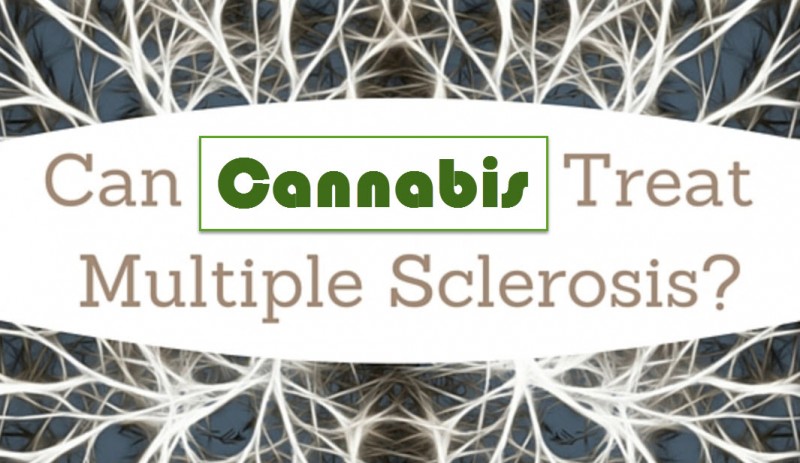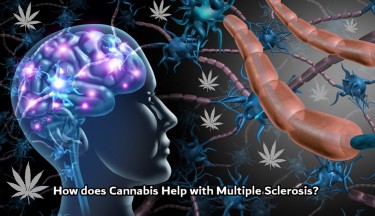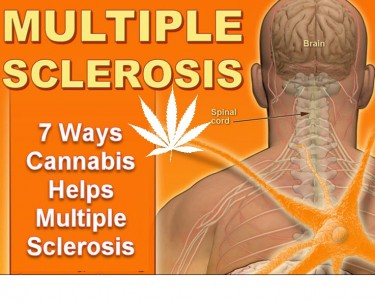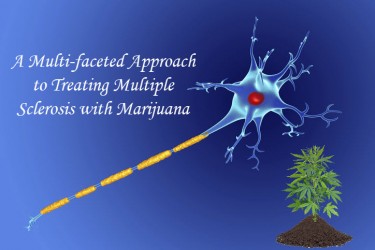Cannabis for Multiple Sclerosis
MS Patients and Medical Cannabis from CannabisNet on Vimeo.
Multiple sclerosis, also known as MS, is a chronic disease that has no cure. Once you have MS, you have it for life; it affects the spinal cord, brain, and optic nerves. MS can cause problems with basic bodily functions including muscle control, balance, and vision. MS affects people differently to varying degrees. Some have mild symptoms and don’t need treatment while others have to live with more debilitating symptoms of MS that make it difficult to perform basic tasks, greatly reducing their quality of life.
MS occurs when the immune system attacks myelin, a fatty material that protects the nerve fibers. Because of the absence of myelin, nerves are damaged and sometimes this can cause the growth of scar tissue. When the nerves are damaged, the brain is unable to send signals throughout the body. Nerves don’t work properly and this can cause tingling and numbness, chronic fatigue, difficulty walking, spasms, muscle weakness, depression, pain, difficulty remembering, and poor bladder control.
Pharmaceutical medications are prescribed to slow down the effects of MS. Steroids can also shorten MS attacks and make them less severe; other kinds of medicines include tranquilizers and muscle relaxants. However, MS medications often come with side effects such as mood disorders, changing a woman’s menstrual cycle, cause chest pain, rapid heart rate, fatigue, nausea, pain, and diarrhea among others.
But there is hope with cannabis: more people are discovering just how effective the plant is in managing the symptoms of MS.
How Cannabis Treats MS
Analgesic: Almost everyone with MS has to cope with extreme pain which is caused by pressure on the musculoskeletal system, muscle spasms, or inflammation. Pain treatment is one of the most widely recognized therapeutic benefits of cannabis. In a 2005 study, medicine with cannabis delivered sublingually was effective in treating sleep disorders and reducing pain among people with MS. Other studies also confirmed that even smoked cannabis is beneficial in reducing pain caused by MS. Cannabis is so useful in treating MS pain symptoms by addressing the immune response, reducing inflammation, and decreases muscoskeletal pain. A 2007 study also showed that THC is more beneficial in reducing MS pain than CBD as well as dronabinol which is a synthetic version of THC.

Anti-inflammatory: Inflammation in the neural tissue is a defining characteristic of MS. Inflammation occurs since the central nervous system is attacked by the immune system. The myelin becomes inflamed before it eventually becomes damaged beyond repair, and this is when the symptoms of MS begin to manifest itself. Cannabis is well-known for its anti-inflammatory properties and has actually been used for thousands of years in cultures around the world for this exact purpose since inflammation is the root cause of dozens of illnesses. In one animal study, mice who were bred to be lacking CB1 receptor showed that they were more prone to neurodegeneration and inflammation when they were injected with an animal version of MS called experimental allergic encephalomyelitis.
Antispasmodic: Another common feature of MS is the presence of muscle spasms, which are involuntary and usually sudden contractions of the muscles. Spasms may be accompanied by extreme, sharp pain that eventually disappears. Cannabis has been shown to be effective in decreasing the frequency and severity of muscle spasms in MS. A 2007 study showed that cannabis was more beneficial in treating muscle spasms than placebo. Cannabis is useful for treating muscle spasms because it addresses inflammation and can slow down the progression of MS.

Antidepressant: Many people diagnosed with MS suffer from depression because the disease also affects the nerves that help to regulate moods. Depression also occurs as a side effect of many MS medications. Cannabis’ antidepressant properties have been recognized since antiquity, and now we have a better understanding why: the human endocannabinoid system is vital for regulating our moods and happiness. Certain endocannabinoids such as anandamides are also critical for this. A study in the UK revealed that 90% of 112 participants with MS reported that cannabis use eased symptoms of emotional dysfunction and reduced depression. In fact, the anti-depressant properties of cannabis are so well-known that many have also started referring to it as the green Prozac. Another study conducted just last year showed that stress caused a decline in cannabis-like molecules that naturally occur in the brain which caused symptoms that mimicked depression.
Abdominal problems: MS patients often suffer from gastrointestinal problems including constipation, abdominal pain, and incontinence. These symptoms are not just an inconvenience but they can also be embarrassing. A 2008 study revealed that up to 60% of participants reported a decrease in the urge to defecate when they took cannabis, 44% reported a decline in incontinence and 30% reported an reduction in defecation. Cannabis is known to be helpful in addressing gut functions because many of the cannabinoid receptors of the peripheral nervous system play a role in this.
There are thousands of case studies of people who have been able to regain control of their life, resumed work, and was able to enjoy quality of life again after using cannabis to address MS.
Have you or a loved one used cannabis for MS? Share your experience with us in the comments below.
OTHER STORIES YOU MAY ENJOY...
HOW MEDICAL MARIJUANA WORKS WITH MS, CLICK HERE.
OR...
CANNABIS FOR MS TAKES OFF, READ THIS, CLICK HERE.
OR...
ALS AND CANNABIS, GET THE LATEST UPDATES, CLICK HERE...









